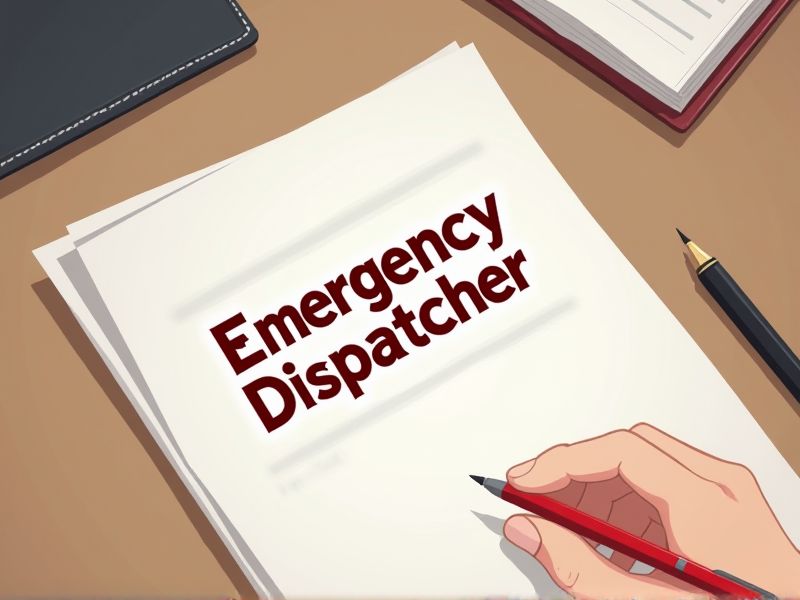
Emergency dispatchers play a critical role in managing crisis situations, where quick and informed decision-making can save lives. Certification ensures they have the necessary skills to effectively communicate, prioritize emergencies, and coordinate with various emergency services. It verifies their ability to handle high-pressure environments and provides assurance of standardized training across the board. Some important certifications you may need for an Emergency Dispatcher role.
Emergency Medical Dispatcher Certification
Emergency Medical Dispatcher Certification is essential because it standardizes training, ensuring dispatchers provide accurate and efficient guidance during emergencies. It equips dispatchers with the skills to assess critical situations quickly, facilitating proper and timely responses. Certification helps maintain consistency across various emergency call centers, reducing errors in high-stress environments. Regulated certification reinforces public trust, knowing their calls are handled by proficient and knowledgeable professionals.
Fire Dispatcher Certification
Fire dispatcher certification ensures that individuals possess the necessary skills to manage emergency communication effectively. Certified dispatchers demonstrate proficiency in rapidly assessing and prioritizing urgent situations. This certification helps maintain standardized protocols, reducing response time and improving overall incident management. As emergency scenarios can be highly unpredictable, a certified dispatcher is better equipped to handle high-pressure environments and contribute to public safety efficiently.
9-1-1 Communications Certification
The 9-1-1 Communications Certification ensures emergency dispatchers possess the essential skills and knowledge for managing high-pressure situations effectively. It provides standardization, helping coordinate efforts across various agencies and enhancing communication efficiency. Certification validates a dispatcher's proficiency in both technology and protocols, reducing errors that could lead to detrimental outcomes. It increases public trust by ensuring dispatchers are trained professionals, capable of handling emergencies competently.
National Academy of Emergency Dispatch (NAED) Certification
The NAED Certification for Emergency Dispatchers ensures adherence to standardized protocols, which increases the efficiency and accuracy of response. This certification enhances dispatcher competence, leading to improved outcomes in critical emergency situations. It instills public trust and confidence in the emergency response system. Being NAED certified often improves career prospects for dispatchers, as many organizations view it as a requisite for employment.
Medical Priority Dispatch System (MPDS) Certification
Gaining MPDS Certification equips emergency dispatchers with standardized protocols, which enhances the consistency and reliability of their decision-making. This certification ensures dispatchers can accurately prioritize emergency calls, ensuring timely and appropriate responses to critical situations. By attaining MPDS Certification, dispatchers are better prepared to assess the severity of incidents, improving patient outcomes. Certification also reinforces legal and procedural accountability, reducing the risk of errors that might lead to legal consequences or compromised public safety.
Incident Command System (ICS-100)
The Incident Command System (ICS-100) standardizes processes, enhancing communication and coordination for emergency dispatchers. This structure reduces confusion during high-pressure situations, leading to more efficient resource allocation. Training in ICS-100 equips dispatchers with the skills to manage incidents swiftly, minimizing potential harm. Consistent application of ICS fosters collaboration across agencies, improving overall emergency response outcomes.
Incident Command System (ICS-200)
The Incident Command System (ICS-200) provides emergency dispatchers with a structured framework, improving coordination and communication during incidents. Training in ICS-200 ensures dispatchers understand their roles within the broader response team, reducing confusion and enhancing efficiency. Dispatchers equipped with ICS-200 skills can facilitate information flow and resource allocation effectively, leading to more timely and organized responses. Adopting ICS-200 standardizes the operational approach across agencies, supporting a unified response to emergencies.
CPR/First Aid Certification
Obtaining a CPR/First Aid Certification equips emergency dispatchers with essential knowledge to guide callers in administering immediate care, potentially improving emergency outcomes before professional help arrives. It enhances the dispatcher's ability to effectively communicate life-saving techniques, reducing panic and ensuring calm instructions under stress. Certification ensures dispatchers maintain a standard of competence, aligning with best practices in emergency response protocols. Real-time application of such skills can bridge crucial time gaps in emergency situations, directly impacting survival rates.
Public Safety Telecommunicator Certification
Public Safety Telecommunicator Certification ensures that emergency dispatchers possess the necessary skills and knowledge to effectively manage crisis situations, reducing response times and improving outcomes. Certification standardizes training across all operators, maintaining consistency in how emergencies are handled, regardless of location. With specialized training, dispatchers can better understand and utilize advanced communication technologies, leading to more accurate information relay and resource deployment. Certification reinforces a commitment to ethical standards and ongoing professional development, fostering public trust in emergency response services.
Emergency Services Communication Systems Certification
Emergency Services Communication Systems Certification ensures dispatchers have the necessary skills to efficiently manage high-pressure situations. Certifications provide standardized training, leading to more effective communication during emergencies. Accredited dispatchers are more likely to correctly interpret critical information, reducing response times. Certification instills confidence in dispatchers, which can enhance team performance and improve public safety outcomes.
Summary
When you ensure that Emergency Dispatchers obtain certifications, their proficiency in handling high-pressure situations improves significantly. This leads to more efficient allocation of resources and quicker response times, enhancing overall emergency management. Consequently, you can expect a reduction in errors and miscommunication, which directly impacts public safety. By supporting dispatcher certification, you contribute to building public trust and confidence in emergency services.
